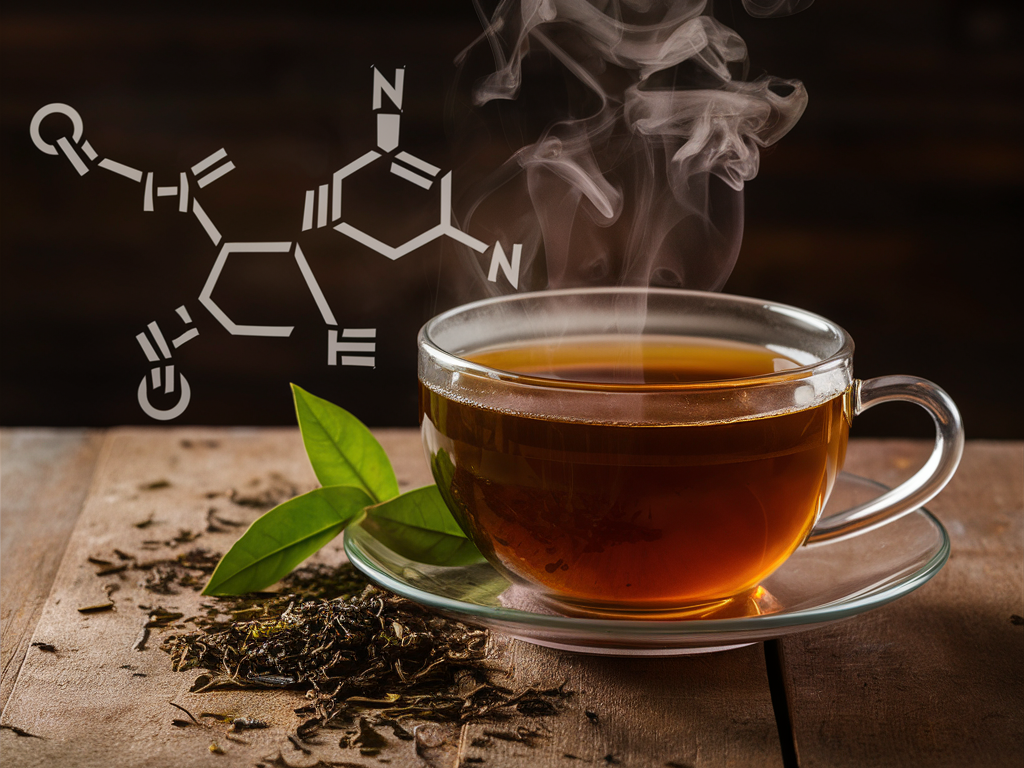L-theanine, a remarkable amino acid naturally occurring in tea leaves, has rapidly gained recognition in the wellness and supplement communities for its numerous health benefits. This compound has the unique ability to cross the blood-brain barrier, directly influencing neurotransmitter activity and brain function. As scientific interest in natural compounds grows, researchers have uncovered compelling evidence supporting L-theanine’s positive effects on mental, physical, and emotional wellbeing.
In this comprehensive exploration, we’ll examine ten scientifically-verified benefits of L-theanine, exploring how this tea-derived compound could potentially transform aspects of your health from stress management to cognitive performance.
Benefit #1: Reduces Stress and Anxiety
One of L-theanine’s most well-documented effects is its ability to promote relaxation without sedation. Research demonstrates that this amino acid stimulates alpha brain wave activity—the same brain waves that increase during meditation and states of calm alertness.
Clinical studies have shown that L-theanine can significantly reduce physiological stress responses. A 2016 study published in the Journal of Physiological Anthropology found that subjects who consumed L-theanine experienced lower heart rates and salivary immunoglobulin A (s-IgA) levels during stress-inducing tasks compared to the placebo group.
Unlike conventional anti-anxiety medications that often cause drowsiness or cognitive impairment, L-theanine promotes relaxation while maintaining alertness. Most studies demonstrating anxiety-reducing effects utilize dosages between 200-400mg, with effects typically noticeable within 30-40 minutes after consumption.
For those dealing with chronic stress or situational anxiety, L-theanine offers a natural alternative without the concerning side effects associated with pharmaceutical interventions.

Benefit #2: Improves Focus and Attention
L-theanine’s cognitive benefits are amplified when combined with caffeine, creating a synergistic effect that enhances attention, mental clarity, and task performance. This natural combination explains why many people report feeling more balanced alertness from tea compared to coffee, despite tea’s lower caffeine content.
A 2008 study in Nutritional Neuroscience found that combining L-theanine (250mg) with caffeine (150mg) improved accuracy during attention-switching tasks and reduced susceptibility to distracting information, compared to either compound alone.
The mechanism behind this enhanced focus involves several pathways. L-theanine increases alpha brain wave activity while moderating the excitatory effects of caffeine. It also affects several neurotransmitters, including increasing dopamine, GABA, and serotonin levels—all crucial for concentration and cognitive performance.
This cognitive enhancement makes L-theanine particularly valuable for students during exam periods, professionals facing deadlines, or anyone requiring sustained mental performance without the jittery side effects typically associated with stimulants.
Benefit #3: Enhances Sleep Quality
Despite not being a sedative, L-theanine has demonstrated remarkable benefits for sleep quality. Rather than forcing sleep like many sleep medications, L-theanine helps prepare the body and mind for rest by promoting relaxation and reducing anxiety.
Research published in the journal Pharmaceutical Biology found that L-theanine significantly improved sleep quality in subjects, particularly by reducing sleep disturbance and the need for sleep medication. Participants reported falling asleep more easily and experiencing more restful sleep without the morning grogginess associated with conventional sleep aids.
The recommended dosage for sleep benefits typically ranges from 200-400mg taken approximately one hour before bedtime. This timing allows the compound to reach peak blood levels as you’re preparing for sleep.
L-theanine’s ability to improve sleep without causing daytime drowsiness or dependency makes it an attractive option for those struggling with occasional sleep difficulties or those looking to enhance their natural sleep cycle.
Benefit #4: Supports Immune Function
Emerging research suggests L-theanine may play a significant role in supporting immune system function. Several studies have demonstrated its ability to enhance the body’s defense against infection and illness.
A study published in Beverages found that L-theanine might strengthen the immune system by supporting the production of T-cells, which defend against various pathogens. Additionally, research in the Journal of Functional Foods revealed that L-theanine could help reduce the incidence of upper respiratory tract infections.
The mechanisms behind these immune-supporting properties include enhancing the function of gamma delta T cells—a critical component of the immune system that acts as the first line of defense against infections. L-theanine also appears to help regulate inflammation, which plays a crucial role in immune response.
These properties make L-theanine particularly valuable during cold and flu season or during periods of increased susceptibility to illness, such as during times of high stress or travel.
Benefit #5: May Lower Blood Pressure
L-theanine shows promising effects on cardiovascular health, particularly regarding blood pressure regulation. Several studies have demonstrated its ability to mitigate increases in blood pressure during stressful situations.
Research published in the Journal of Physiological Anthropology found that L-theanine helped prevent blood pressure elevation in adults experiencing acute stress. Another study in Nutrients showed that regular L-theanine consumption might help individuals with high-normal blood pressure or stage 1 hypertension.
The mechanisms behind these cardiovascular benefits likely involve L-theanine’s ability to reduce sympathetic nervous system activation during stress. It may also promote vascular relaxation through increased nitric oxide production, which helps dilate blood vessels.
While L-theanine isn’t a replacement for prescribed blood pressure medications, it may serve as a complementary approach for those looking to support healthy blood pressure levels, especially under stressful conditions.
Benefit #6: Neuroprotective Properties
L-theanine exhibits significant neuroprotective properties that may help preserve cognitive function and protect brain cells against damage and degeneration.
Research published in Phytotherapy Research suggests that L-theanine may protect neurons from oxidative stress and excitotoxicity—both key factors in neurodegenerative conditions. Another study in Free Radical Biology and Medicine demonstrated that L-theanine could reduce neuronal death following cerebral ischemia (restricted blood flow to the brain).
The neuroprotective mechanisms of L-theanine include inhibiting glutamate excitotoxicity, scavenging free radicals, and regulating key neurotransmitters. These properties may help preserve cognitive function during aging and potentially slow the progression of conditions affecting neurological health.
While more research is needed, preliminary studies suggest L-theanine could play a role in comprehensive approaches to brain health, particularly for those concerned about age-related cognitive decline or with family histories of neurodegenerative conditions.

Benefit #7: Mood Enhancement
Beyond its anti-anxiety effects, L-theanine demonstrates broader mood-enhancing properties that may benefit those experiencing low mood or depressive symptoms.
L-theanine influences several neurotransmitter pathways crucial for mood regulation. It increases levels of dopamine, serotonin, and GABA—neurotransmitters associated with pleasure, satisfaction, and relaxation. A study in the Journal of Nutrition & Intermediary Metabolism found that L-theanine supplementation significantly reduced symptoms of depression and anxiety in subjects with major depressive disorder.
Compared to traditional mood-enhancing supplements like St. John’s Wort, L-theanine typically works more quickly and with fewer potential interactions with medications. When combined with other natural mood boosters like vitamin D or omega-3 fatty acids, the effects may be complementary.
The mood-enhancing effects of L-theanine make it a valuable consideration for those experiencing stress-related mood disturbances or looking for natural approaches to emotional wellbeing.
Benefit #8: Reduces Negative Effects of Caffeine
For coffee enthusiasts who experience jitters, anxiety, or sleep disturbances from caffeine, L-theanine offers a simple yet effective solution. This amino acid can mitigate caffeine’s undesirable effects while preserving its cognitive benefits.
Research in Biological Psychology demonstrated that combining L-theanine with caffeine reduced the blood pressure increase typically caused by caffeine alone. Participants also reported less jitteriness and anxiety while maintaining improved alertness and focus.
The optimal ratio appears to be approximately 2:1 (L-theanine to caffeine). For a typical cup of coffee containing 100mg of caffeine, adding 200mg of L-theanine can create a balanced, smooth energy without the subsequent crash or anxiety.
This natural combination explains why many people find green tea provides a more balanced energy boost than coffee—green tea naturally contains both caffeine and L-theanine, typically in a ratio of roughly 1:2 (caffeine to L-theanine).
Benefit #9: May Help Weight Management
While not primarily marketed as a weight management supplement, emerging research suggests L-theanine may support healthy weight maintenance through several indirect mechanisms.
Studies in the Journal of Functional Foods indicate that L-theanine might influence metabolism and fat oxidation. Research also suggests it may help reduce stress-related eating by lowering cortisol levels and diminishing emotional eating triggers.
Animal studies have shown promising results regarding L-theanine’s effect on fat accumulation and metabolism. A study in in vivo demonstrated that L-theanine supplementation reduced body weight gain and fat accumulation in mice fed a high-fat diet.
While L-theanine shouldn’t be viewed as a weight loss miracle, its stress-reducing properties may help create favorable conditions for weight management by reducing stress-eating, improving sleep quality, and potentially supporting metabolic function.
Benefit #10: Enhances Cognitive Performance Under Stress
Perhaps one of L-theanine’s most valuable benefits is its ability to preserve cognitive function during high-stress situations—when mental performance typically declines.
Research published in Biological Psychology found that L-theanine reduced subjective stress responses during challenging cognitive tasks. Importantly, participants maintained attention and performance during stressful conditions that would typically impair cognitive function.
This cognitive resilience stems from L-theanine’s ability to modulate alpha brain waves while attenuating the body’s stress response. By reducing the physiological and psychological impacts of stress, L-theanine helps maintain clear thinking and decision-making capabilities even under pressure.
These properties make L-theanine particularly valuable before situations like examinations, public speaking, important meetings, or any scenario where maintaining cognitive clarity under pressure is crucial.

Conclusion: The Promise of L-Theanine
The research surrounding L-theanine reveals a compound with remarkable versatility and a strong safety profile. From stress reduction and improved focus to better sleep and enhanced immune function, L-theanine offers evidence-based benefits that address many common wellness concerns.
For most healthy adults, L-theanine appears safe at doses ranging from 100-400mg daily. However, as with any supplement, consultation with healthcare providers is recommended, especially for pregnant or nursing women, those with medical conditions, or individuals taking medication.
While certain populations should exercise caution, the research suggests L-theanine may offer particular benefits for the elderly (supporting cognitive function), students (enhancing learning and focus), high-stress professionals (reducing anxiety while maintaining performance), and those with sleep difficulties.
As research continues, our understanding of L-theanine’s mechanisms and applications will undoubtedly expand. Current evidence already suggests this amino acid, whether consumed through quality tea or as a supplement, deserves consideration in comprehensive approaches to mental and physical wellbeing.
Additional Resources
Recommended Reading:
- “The Effects of L-Theanine on Alpha-Band Oscillatory Brain Activity During a Visuo-Spatial Attention Task” – Neuropharmacology
- “L-Theanine and Caffeine in Combination Affect Human Cognition as Evidenced by Oscillatory Alpha-Band Activity and Attention Task Performance” – Journal of Nutrition
- “Effects of L-Theanine Administration on Stress-Related Symptoms and Cognitive Functions in Healthy Adults” – Nutrients
Natural Sources of L-Theanine:
- Green tea (particularly shade-grown varieties like Gyokuro)
- Black tea
- White tea
- Some mushroom varieties (in small amounts)
Before beginning L-theanine supplementation, especially at higher doses, consultation with a healthcare provider is recommended to ensure it’s appropriate for your individual health circumstances and won’t interact with any medications or existing conditions.

